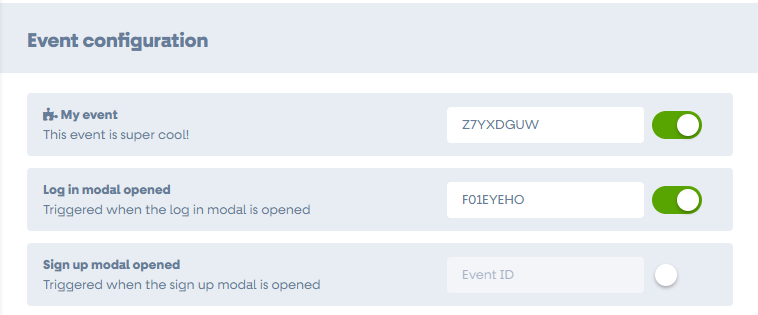blomstra / fathom-analytics
Integrate Fathom Analytics into your Flarum forum.
Installs: 25
Dependents: 0
Suggesters: 0
Security: 0
Stars: 0
Watchers: 4
Forks: 0
Open Issues: 0
Language:TypeScript
Type:flarum-extension
pkg:composer/blomstra/fathom-analytics
Requires
- flarum/core: ^1.2.0
This package is auto-updated.
Last update: 2026-02-14 00:07:38 UTC
README
A Flarum extension. Integrate Fathom Analytics into your Flarum forum.
You can add custom events through your own extension! For more info, read the extending section
Installation
Install with composer:
composer require blomstra/fathom-analytics:"*"
Updating
composer update blomstra/fathom-analytics:"*"
php flarum migrate
php flarum cache:clear
Links
Extending
This extension is designed to be built upon by other Flarum extensions. We've tried to make this as simple as possible for you to do.
Creating an event
All custom events should be defined in your extension's common folder. Create a new folder inside js/src/common named fathomEvents. This is where all your custom events will be stored.
Create a new Javascript/Typescript file in this folder with the following template:
import { extend } from "flarum/common/extend"; export default { name: "My event", description: "Triggered when someone does something", id: "extension_name.event_name", code(e) { // tracking code }, };
Fill in the metadata accurately. It's strongly recommended that your id is scoped to your extension to prevent conflicts.
You can import any Flarum code into this file, and run it inside the code(e) { } method. To track an event occurring, call e.track() and the extension will handle the rest.
⚠️ Due to how the Fathom extension is designed, you will often need to import files from the
forumnamespace from Flarum or other extensions. This is ok, even though this file is incommon, provided you only use these imports inside thecode(e)method.
For example, if you want to track when any button is clicked in Flarum, your event might look like this:
import { extend } from "flarum/common/extend"; import Button from "flarum/common/components/Button"; export default { name: "Button clicked", description: "Triggered when any button is clicked", id: "my_extension.any_button_clicked", code(e) { const track = () => e.track(); extend(Button.prototype, ["oncreate", "onupdate"], function () { this.$().on("click", track); }); extend(Button.prototype, "onremove", function () { this.$().off("click", track); }); }, };
For more examples of events, check out the default events included with the extension: js/src/common/DefaultEvents.
Registering your events
After you define your events, you need to register them with the extension.
To do this, create a new file at src/js/common/registerFathomEvents.js.
In this file, export a function which registers your events with app.fathomEventsRepository:
import app from "flarum/common/app"; import AnyButtonClicked from "./fathomEvents/AnyButtonClicked"; export function registerFathomEvents() { // Don't attempt to register events when the // Fathom Analytics extension is disabled if (!("blomstra-fathom-analytics" in flarum.extensions)) return; app.fathomEventsRepository.registerEvent(AnyButtonClicked); }
You should import and call this registerFathomEvents() function in your src/admin/index.js and src/forum/index.js files.
If you have multiple custom events, you can chain calls to
registerEvent():app.fathomEventsRepository .registerEvent(MyEvent1) .registerEvent(MyEvent2) .registerEvent(MyEvent3);
If you build your extension JS, you should see your custom event(s) inside the Fathom Analytics extension settings. Custom events are accompanied by a small plug-in icon to show that they are from another extension.
Typescript support
For Typescript typings support, copy the code below into a new file at js/src/@types/fathom.d.ts. Typescript should automatically pick this up and remove those red squiggles under your code:
type FathomEventParams = Pick< FathomEvent, "id" | "code" | "name" | "description" >; interface FathomEventAttributeData { [key: string]: { eventId: string; enabled: boolean; }; } interface EventsRepository { // private events: Record<string, FathomEvent> = {}; getAllEvents(): FathomEvent[]; registerEvent(event: FathomEventParams): EventsRepository; getEnabledEvents(): FathomEvent[]; isEventEnabled(eventId: string): boolean; getServerEventData(): FathomEventAttributeData; propogateServerEventData(): void; saveServerEventData(eventData: FathomEventAttributeData): Promise<void>; getEnabledEventIDs(): string[]; } declare module "flarum/common/Application" { export default interface Application { fathomEventsRepository: EventsRepository; } } export interface FathomEvent { /** * Unique ID to represent the event * * You should prefix this with your extension ID to avoid collisions */ id: string; /** * A code snippet to execute to set up the event. * * If your event needs to extend core or extension JS, you should call * `extend` or `override` within this snippet. * * This will only be executed if the event is enabled in the admin * dashboard. * * `this` will be assigned to the FathomEvent object. * * To log the event, call `e.track()`. * * **You can use `forum`-scoped imports within this block as the * code will never be executed on the admin dashboard.** */ code: (e: FathomEvent) => boolean | void; /** * An array of extension IDs exposed in `flarum.extensions` to check exist before enabling an event. * * This is useful if your event depends on an extension, for example. * * @example `['flarum-tags']` */ requiresExtensions?: string[]; /** * A name for the event to show in the admin dashboard */ name: string; /** * A description for the event to show in the admin dashboard */ description: string; /** * Fathom event ID for tracking purposes. */ fathomEventId: string; /** * Log the event to Fathom. */ track: () => void; }

